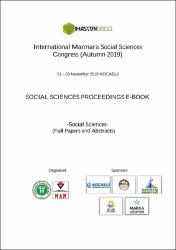| dc.contributor.author | Boyraz, Mehmet | |
| dc.date.accessioned | 2020-01-07T12:30:18Z | |
| dc.date.available | 2020-01-07T12:30:18Z | |
| dc.date.issued | 2019 | en_US |
| dc.identifier.isbn | 978-605-69509-5-7 | |
| dc.identifier.uri | http://www.imascon.com/dosyalar/imascon2019guz/imascon_sosyal_bildiriler_guz_2019.pdf | |
| dc.identifier.uri | https://hdl.handle.net/11630/7985 | |
| dc.description.abstract | Bu araştırmanın amacı termal otel işletmelerinde jeotermal kaynak kullanımının arz, kullanım alanları, avantaları ve ikincil suların değerlendirilmesi açısından incelenmesidir. Araştırmanın evrenini, Nisan 2018 itibariyle Türkiye’de 25 ayrı ilde faaliyet gösteren T.C. Kültür ve Turizm Bakanlığı tarafından turizm işletme belgeli 83 termal otel işletmesi oluşturmaktadır. Araştırma kapsamında herhangi bir örnekleme alınmamış ve tam sayım ile tüm evrene ulaşılmaya çalışılmıştır. Araştırma nicel olarak tasarlanmış olup veri toplama aracı olarak anket tekniği kullanılmıştır. Verilerin toplanmasında dokuzu çevrimiçi ve 31’i yüz yüze olmak üzere toplam 40 yöneticiye anket uygulanmış. Elde edilen veriler sıklık ve yüzde analizine tabi tutulmuştur. Araştırma sonucunda, termal otel işletmelerinde jeotermal kaynakların %82,5 ile en çok termal havuzlarda ve SPA bölümlerinde ve temel olarak %81,8’lik oranda sağlık ve tedavi amacıyla kullanıldığı; jeotermal kaynakların en büyük faydasının %70 ile otelin doluluğunu artırma yönünde olduğu; ikincil termal suları geri dönüşüme gönderme oranlarının ise %42,5 ile sınırlı kaldığı tespit edilmiştir. | en_US |
| dc.description.abstract | The purpose of the study is to evaluate the use of geothermal resources in terms of where and how to
supply of it, operating areas, benefits, where and how to utilize the secondary waters in thermal hotel
enterprises. The research population, consists of 83 thermal hotel establishments which are certified by
the Ministry of Culture and Tourism and operates in 25 different provinces in Turkey as of April 2018.
No sampling was conducted within the scope of the research and it is aimed to reach the whole
population with full count. The research was designed as a quantitative method and the as a data
collection tool survey technique was used. To collect the data, a total of 40 managers were
interviewed, nine of whom were online and 31 were face to face. Frequency and percentage analysis
were used to examine obtained data. As a result of the research, it was found that the thermal springs
in were used with 82.5% in thermal pools and SPA sections, and mainly 81.8% in basic health and
treatment; the major benefit of geothermal resources is to increase the occupancy rate of the hotel with
70%; the ratio of sending secondary thermal waters to recycling was limited to 42.5%. | en_US |
| dc.language.iso | tur | en_US |
| dc.publisher | Uluslararası Marmara Sosyal Bilimler Kongresi IMASCON 2019 GÜZ | en_US |
| dc.rights | info:eu-repo/semantics/openAccess | en_US |
| dc.subject | Turizm | en_US |
| dc.subject | Jeotermal Kaynak | en_US |
| dc.subject | Termal Otel İşletmeleri | en_US |
| dc.subject | Yönetsel Bakış | en_US |
| dc.subject | Tourism | en_US |
| dc.subject | Geothermal Resources | en_US |
| dc.subject | Thermal Hotel Establishment | en_US |
| dc.subject | Managerial Perspective | en_US |
| dc.title | Jeotermal kaynak kullanımı: Termal oteller örneği | en_US |
| dc.title.alternative | The use of geothermal resources: Case of thermal hotels | en_US |
| dc.type | conferenceObject | en_US |
| dc.relation.journal | Uluslararası Marmara Sosyal Bilimler Kongresi IMASCON 2019 GÜZ | en_US |
| dc.department | Turizm Fakültesi | en_US |
| dc.authorid | 0000-0001-6755-1999 | en_US |
| dc.identifier.startpage | 429 | en_US |
| dc.identifier.endpage | 435 | en_US |
| dc.relation.publicationcategory | Konferans Öğesi - Uluslararası - Kurum Öğretim Elemanı | en_US |
| dc.contributor.institutionauthor | Boyraz, Mehmet | |



















